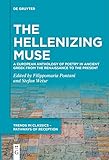The Hellenizing Muse : A European Anthology of Poetry in Ancient Greek from the Renaissance to the Present / ed. by Filippomaria Pontani, Stefan Weise.
Material type: TextSeries: Trends in Classics – Pathways of Reception ; 6Publisher: Berlin ; Boston : De Gruyter, [2021]Copyright date: ©2021Description: 1 online resource (IX, 831 p.)Content type:
TextSeries: Trends in Classics – Pathways of Reception ; 6Publisher: Berlin ; Boston : De Gruyter, [2021]Copyright date: ©2021Description: 1 online resource (IX, 831 p.)Content type: - 9783110641233
- 9783110652871
- 9783110652758
- 881/.0309 23
- PA5250 .H45 2022
- online - DeGruyter
- Issued also in print.
| Item type | Current library | Call number | URL | Status | Notes | Barcode | |
|---|---|---|---|---|---|---|---|
 eBook
eBook
|
Biblioteca "Angelicum" Pont. Univ. S.Tommaso d'Aquino Nuvola online | online - DeGruyter (Browse shelf(Opens below)) | Online access | Not for loan (Accesso limitato) | Accesso per gli utenti autorizzati / Access for authorized users | (dgr)9783110652758 |
Frontmatter -- Contents -- List of Figures -- General Introduction -- Timeline -- Greece -- Italy -- Germany -- The Low Countries -- The Bohemian Lands -- Switzerland -- France -- Balkans -- Hungary -- Great Britain -- Iberia -- Poland and Lithuania -- Russia -- Austria -- Nordic Countries -- List of Contributors -- Index Librorum Manuscriptorum -- Index Selectivus Personarum -- Index Selectivus Rerum Memorabilium -- Index Graecitatis (neologismi, hapax legomena, verba rara)
restricted access online access with authorization star
http://purl.org/coar/access_right/c_16ec
Traditionally, the history of Ancient Greek literature ends with Antiquity: after the fall of Rome, the literary works in ancient Greek generally belong to the domain of the Byzantine Empire. However, after the Byzantine refugees restored the knowledge of Ancient Greek in the west during the early humanistic period (15th century), Italian scholars (and later their French, German, Spanish colleagues) started to use Greek, a purely literary language that no one spoke, for their own texts and poems. This habit persisted with various ups and downs throughout the centuries, according to the development of Greek studies in each country. The aim of this anthology - the first one of this kind - is to give a selective overview of this kind of humanistic poetry in Ancient Greek, embracing all major regions of Europe and trying to concentrate on remarkable pieces of important poets. The ultimate goal of the book is to shed light on an important and so far mostly neglected aspect of the European heritage.
Issued also in print.
Mode of access: Internet via World Wide Web.
In English.
Description based on online resource; title from PDF title page (publisher's Web site, viewed 28. Feb 2023)


